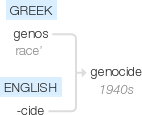Genocide
1940s: from Greek genos ‘race’ + -cide.
wiktionary
Apparently coined by Polish legal scholar Raphael Lemkin in 1943 or 1944 in reference to the Armenian Genocide and the Jewish Holocaust. [1] [2] [3] [4] From the stem of Ancient Greek γένος(génos, “race, kind”) (cognate with Latin gēns(“tribe, clan”), whence genus) + -cide(“killing, killer”). [5] Compare genticide.
etymonline
genocide (n.)
1944, apparently coined by Polish-born U.S. jurist Raphael Lemkin (1900-1959) in his work "Axis Rule in Occupied Europe" [p.19], in reference to Nazi extermination of Jews, literally "killing a tribe," from Greek genos "race, kind" (from PIE root *gene- "give birth, beget," with derivatives referring to procreation and familial and tribal groups) + -cide "a killing." The proper formation would be *genticide.
Generally speaking, genocide does not necessarily mean the immediate destruction of a nation, except when accomplished by mass killings of all members of a nation. It is intended rather to signify a coordinated plan of different actions aimed at the destruction of essential foundations of the life of national groups, with the aim of annihilating the groups themselves. [Lemkin]
Earlier in a similar sense was populicide (1799), from French populicide, by 1792, a word from the Revolution. This was taken into German, as in Völkermeuchelnden "genocidal" (Heine), which was Englished 1893 as folk-murdering. Ethnocide is attested from 1974 in English (1970 in French).
